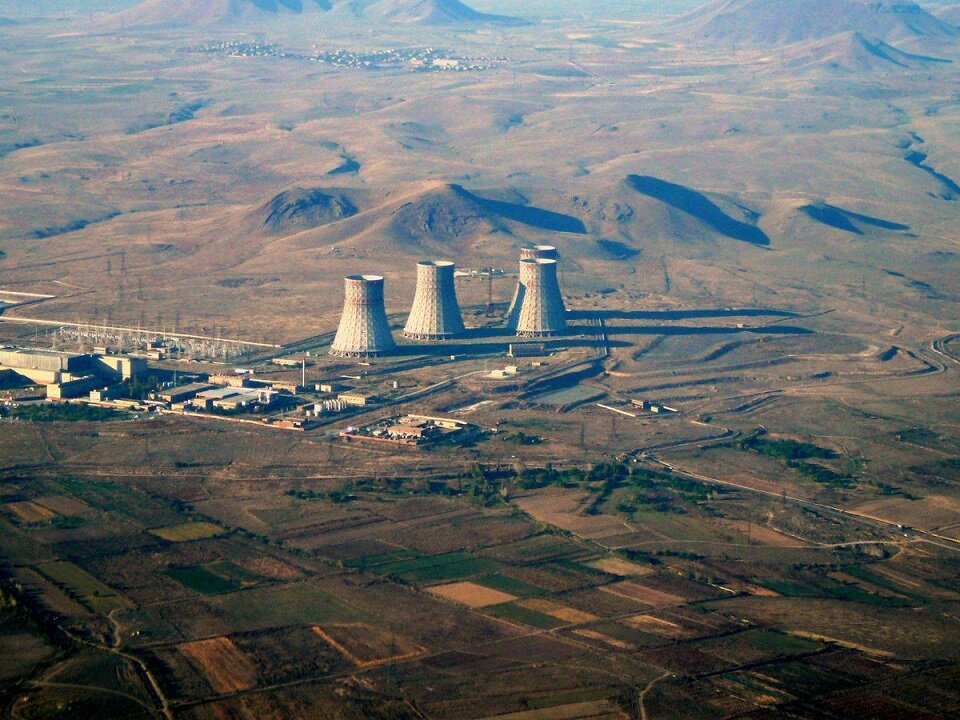An Aliyev propagandist is fueling a growing wave of alarmist media reports targeting Armenia’s Metsamor Nuclear Power Plant (ANPP), in what appears to be a coordinated disinformation campaign portraying the facility as an imminent regional threat. Over the past few weeks, Turkish, British, and Israeli outlets have published near-identical stories using sensationalist headlines, Cold War-era rhetoric, and questionable expert commentary—driven largely by Azerbaijani-aligned commentator Peter Marko Tase—branding Metsamor as “the next Chernobyl” and a “ticking time bomb.”
Zartonk Media journalist Arpine Hovhannisian conducted a detailed analysis to understand the motives behind this wave of media reports, given the sensitive nature of the topic.
Vahe Davtyan, Doctor of Political Sciences, professor, and energy security expert, was the first to publicly condemn this media campaign. In a Facebook post, he accused Turkey’s NTV and the UK’s Daily Mail of reviving Cold War-era anti-nuclear tropes to frame the Armenian NPP as a Chernobyl-style threat.
“The two media platforms have synchronized their narratives, using outdated clichés, alarmist language, and unverified ‘expert’ claims,” Davtyan wrote. “This is not a coincidence. It is a calculated information strike.”
The Turkish press also echoed this rhetoric with headlines such as “Nuclear Danger on the Armenian Border,” asserting that the Soviet-era facility, located just 16 kilometers from the Turkish border, poses a severe hazard due to its proximity to a seismic fault line.
A key figure behind this narrative push is Peter Marko Tase, portrayed in multiple outlets as a political scientist and journalist. The Daily Mail article titled “The next Chernobyl? Soviet-era nuclear power plant is branded a ‘ticking time bomb’ that could go off at ’any moment’” quotes Tase as saying:
“Due to Armenia’s lack of economic resources and the reactor’s precarious structure, we can ascertain that such a nuclear reactor is an explosive that could go off at any moment.”
Although often presented as a South Caucasus expert, Peter Marko Tase is, in reality, a propagandist and outspoken supporter of Ilham Aliyev’s regime. He holds the title of Honorary Professor of U.S. Foreign Policy and History at the Azerbaijan University of Languages in Baku—a role that further highlights his close alignment with Azerbaijani state institutions.
Tase’s anti-Armenian stance was evident as early as March 2023, when he criticized the Biden administration’s decision to invite Armenia, but not Azerbaijan or Türkiye, to the Summit for Democracy in Washington. In an interview with Azerbaijan’s Trend news agency, he labeled Armenia an “autocratic regime” while describing Azerbaijan as a “thriving democratic society,” calling the exclusion of Baku and Ankara “blatantly implausible.”
“The Republic of Azerbaijan embodies the essential components of a thriving democratic society,” Tase said, accusing Armenia of conspiring “with America’s enemies abroad.” He further claimed the invitation to Yerevan, and not to Baku or Ankara, reflected a flawed U.S. foreign policy direction. “The geopolitical proclivity of the Biden-Harris Administration is deeply puzzling and exposes a vulnerable U.S. foreign policy that does not reflect the political and military interests of Washington,” he added.
Tase’s efforts to cast doubt on the safety of the Armenian Nuclear Power Plant began well before his commentary appeared in the Daily Mail.
In an article authored by Tase himself, titled “America can’t ignore the nuclear time bomb at Metsamor power plant,” first published on July 11 in the Jewish News Syndicate (JNS) and later reprinted on MENAFN, the Middle East North Africa Financial Network, he laid the groundwork for what appears to be a coordinated media strategy.
He then pushed the same message to British press, including the Daily Mail and This is Money, where he was the sole “expert” cited in near-identical articles, suggesting a coordinated attempt to manufacture panic.
Despite the claims that Azerbaijani, Turkish, and Israeli media sources seem to be deliberately amplifying, multiple international bodies have confirmed the safety and modernization of the Armenian NPP.
In 2021, an IAEA (International Atomic Energy Agency) team of experts concluded a long-term operational safety review of the plant, reporting that Armenia had “completed an extensive modernization and safety improvement programme this year, including replacement of a large number of components of emergency systems; modernization of emergency systems and the control and monitoring systems.” The team’s leader noted that the Armenian Nuclear Power Plant had “improved preparedness for safe long-term operation.”
Further reaffirming this, on October 4–5, 2022, IAEA Director General Rafael Grossi visited Armenia and toured the Metsamor plant. Grossi stated he was impressed by the progress since his previous visit, noting that “tremendous work” had been carried out to ensure “safe and reliable operation of the plant in the future.” In his own words:
“I made sure that you really deserved the support that the IAEA provided. Keep working with the same spirit, and we, in turn, will do our best to support you.”
When asked about Turkish demands to close the Metsamor plant, Grossi told Armenpress: “The IAEA has absolutely no plans to close the Armenian NPP,” emphasizing that “Armenia continues to work seriously with the IAEA and reinforces the safety of the facility. The IAEA is very confident in the matter.”
He reiterated this position at the end of 2023, reaffirming that the Metsamor plant meets international safety standards and can remain operational.
“The Armenian Nuclear Power Plant is following the safety recommendations and guidance from the IAEA,” Grossi said. “This is very important. There have been important refurbishments done at the facility which were found to be indispensable. So we can continue operating.”


